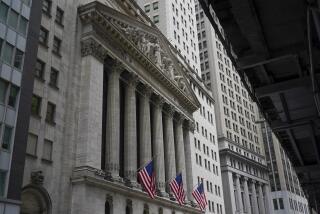Fitbit Inc. flexes its muscle in a robust stock debut
- Share via
Fitbit Inc.’s stock soared in its debut Thursday in response to rapid growth for the industry leader in fitness-tracking devices.
But the rally, coming amid a sharp rise in valuations for technology firms overall, raised the question of whether Fitbit’s stock was getting a step ahead of itself because Fitbit faces no shortage of rivals.
After San Francisco-based Fitbit priced its initial public offering at $20 a share — well above early expectations — the stock with the symbol “FIT” closed at $29.68 on the New York Stock Exchange after trading as high as $31.90.
That gave Fitbit a total market value of $6.1 billion. Fitbit sold 36.6 million shares in the IPO out of nearly 205 million total shares outstanding, raising $732 million for the company.
The proceeds were the highest for a U.S.-listed tech company IPO so far this year, according to the research firm Dealogic Ltd.
Fitbit’s market jump “was a little north of what I expected but not too surprising” because Fitbit not only leads a fast-growing industry for wearable tracking devices but is also profitable, said analyst Ramon Llamas of the research firm International Data Corp.
In a note posted on Fitbit’s website, Chief Executive James Park called the offering “a huge milestone for us … we can’t wait to see what’s next.”
Fitbit’s devices and other activity trackers have gained popularity for their ability to count steps, monitor calories burned and track time spent sleeping, among other things, which appeals to health-conscious, data-obsessed consumers.
Founded in 2007, Fitbit provides a multiplatform approach to health and fitness, integrating mobile apps and websites with colorful tracking devices that can be worn as bracelets or clipped to clothing.
Fitbit’s sales last year of $745.4 million were nearly 10 times its sales of $76.4 million two years earlier. Fitbit turned a $131.8-million profit in 2014.
Last year the company sold 10.9 million devices — suggested retail prices range from $59.95 to $249 — in 45,000 retail stores in more than 50 countries as well as online, according to the IPO’s prospectus.
In the first quarter of this year, Fitbit had a leading 34.2% of worldwide shipments of wearable device trackers, IDC estimated.
In a report Thursday, IDC said the industry’s global shipments will more than double this year, to 72.1 million from 26.4 million in 2014, and are forecast to jump to 155.7 million in 2019.
The fitness devices are part of an exploding wearable computing market. Touted as the next big thing in technology, wearable tech has spawned a dizzying array of Internet-connected wristwatches, “smart” clothing and jewelry and head-mounted devices.
But competition is stiff in the fitness-tracking arena, with Fitbit facing rival products from Jawbone, Misfit and Garmin, along with China’s Xiaomi Inc., which makes the Mi Band device.
Then there’s Apple Inc.’s new smartwatch, which Fitbit’s prospectus noted was a potential risk for its future business because the Apple device will have “some health and fitness-tracking capabilities.”
Although it’s impossible to know how much of a threat the Apple Watch or smartphone fitness apps will pose to Fitbit, there are cautionary tales. For instance, the proliferation of smartphones with GPS undercuts the sales of expensive dashboard GPS navigation systems.
Research firm GfK predicted in a recent report that smartwatch sales will surge this year, partly because of heavy marketing, and will surpass fitness tracker sales for the first time.
Fitbit has stumbled at times. Last year, the company recalled its Fitbit Force tracker after some customers complained of rashes and blisters on their wrists.
Fitbit’s strong IPO joined surging valuations of tech companies, fueling concerns about another tech bubble.
Based on capital already raised, nonpublic start-ups such as ride-sharing firm Uber Technologies Inc. and video-messaging application Snapchat Inc. command multibillion-dollar valuations. New investments in venture-capital funds jumped to $30 billion in 2014 from $17.7 billion in 2013, the National Venture Capital Assn. said. Venture-capital investments in start-ups hit $49.3 billion last year, the most since 2000 and the third-highest ever, the group said.
Times staff writers Andrea Chang, Daina Beth Solomon and Dean Starkman contributed to this report.
More to Read
Inside the business of entertainment
The Wide Shot brings you news, analysis and insights on everything from streaming wars to production — and what it all means for the future.
You may occasionally receive promotional content from the Los Angeles Times.











